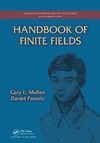"Poised to become the leading reference in the field, the Handbook of Finite Fields is exclusively devoted to the theory and applications of finite fields. More than 80 international contributors compile state-of-the-art research in this definitive handbook. Edited by two renowned researchers, the book uses a uniform style and format throughout and each chapter is self contained and peer reviewed. The first part of
the book traces the history of finite fields through the eighteenth and nineteenth centuries. The second part presents theoretical properties of finite fields, covering polynomials, special functions, sequences, algorithms, curves, and related computational aspects. The final part describes various mathematical and practical applications of finite fields in combinatorics, algebraic coding theory, cryptographic systems, biology, quantum information theory, engineering, and other areas. The book provides a comprehensive index and easy access to over 3,000 references, enabling you to quickly locate up-to-date facts and results regarding finite fields" — "Preface The CRC Handbook of Finite Fields (hereafter referred to as the Handbook) is a reference book for the theory and applications of nite elds. It is not intended to be an introductory textbook. Our goal is to compile in one volume the state of the art in research in nite elds and their applications. Hence, our aim is a comprehensive book, with easy-to-access references for up-to-date facts and results regarding nite elds. The Handbook is organized into three parts. Part I contains just one chapter which is devoted to the history of nite elds through the 18-th and 19-th centuries. Part II contains theoretical properties of nite elds. This part of the Handbook contains 12 chapters. Chapter 2 deals with basic properties of nite elds; properties that are used in various places throughout the entire Handbook. Near the end of Section 2.1 is a rather extensive list of recent nite eld-related books; these books include textbooks, books dealing with theoretical topics as well as books dealing with various applications to such topics as combinatorics, algebraic coding theory for the error-free transmission of information, and cryptography for the secure transmission of information. Also included is a list of recent nite eld-related conference proceedings volumes. Chapter 2 also provides rather extensive tables of polynomials useful when dealing with nite eld computational issues. The website http://www.crcpress.com/product/isbn/ 9781439873786 provides larger and more extensive versions of the tables presented in Section" —
 |
|
О проекте
|
|
О проекте


